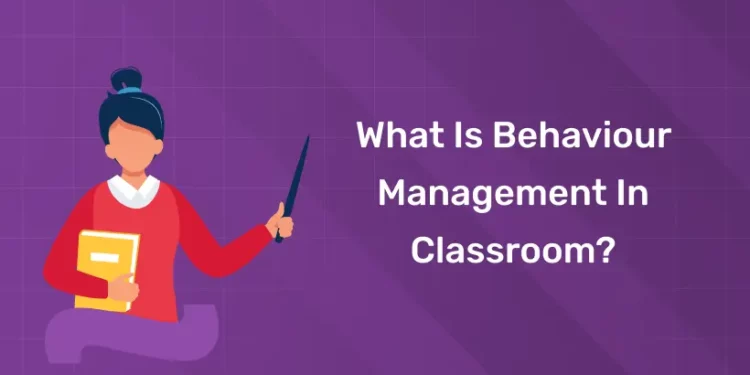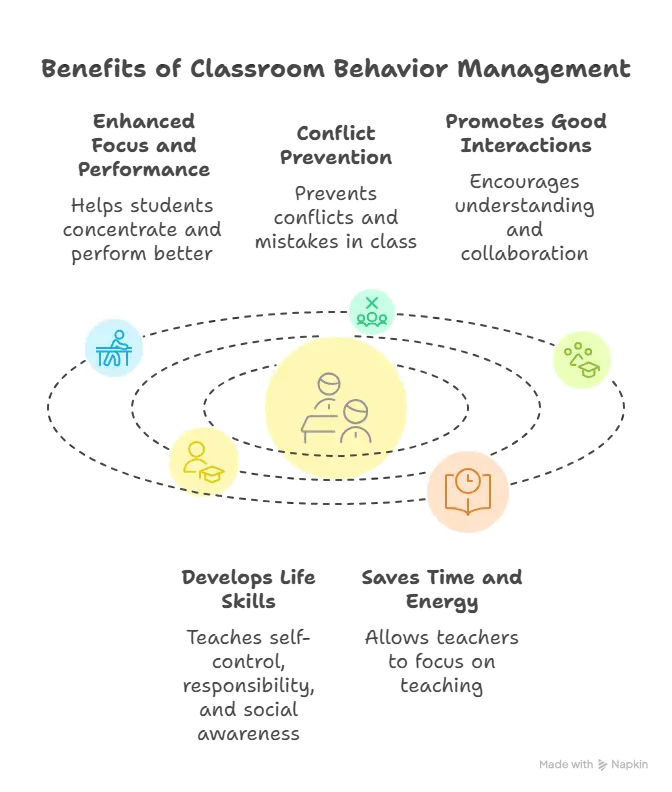Table of Contents
Teachers employ behavior management in the classroom to guide, help, and regulate how students act so that the classroom is a nice and effective environment to learn. It is all about teaching kids how to be polite, disciplined, and kind, as well as preventing issues before they develop. Helpful behavior management helps to ensure that teaching and learning run well, which is helpful for both teachers and students.
Enroll in the Montessori Teachers Training Course! Get a free Demo Here!
What is Behaviour Management in the Classroom?
To help their students perform well in class, teachers employ a number of different ways to keep them in line. Not just punishing kids for bad conduct, but also making sure they know what is expected of them, follow the rules, and learn how to control themselves.
How well does managing behavior work?
- You should tell the kids to be courteous and do the right thing.
- Help you learn more.
- Both instructors and students need to feel comfortable, supported, and able to get things done in class.
Teachers may employ behavior management to help kids learn how to regulate their actions, make good decisions, and get along with others.
Why is Behaviour Management Important?
1: What is the primary focus of the first plane of development in the Montessori method?
Building a learning environment requires classroom behavior management. Its importance includes:
- Well-managed classrooms help students focus and perform better.
- Using good behavior management tactics prevents conflicts and mistakes in class.
- Promotes Good Interactions: It helps students and teachers understand, collaborate, and appreciate one other.
- Students learn self-control, responsibility, and social awareness that they may utilize outside of class.
- Saves instructors’ time and energy: Instead of dealing with unruly pupils, instructors can educate.
A well-managed classroom benefits teachers and students, and this is only achievable with good behavior management.
Get Certified & Start Your Montessori Career
Montessori Teacher Training Course by Entri App: Gain expert skills, earn certification, and kickstart your teaching career.
Join Now!Key Principles of Behaviour Management
Good school behavior control starts with these concepts.
- Apply discipline and penalties fairly and regularly. All pupils must obey the rules.
- Rules and expectations must be known. Being exact is important. Students need to know the rules.
- Praise and prizes encourage good behavior in kids. Please remember to be thankful, congratulate others, and earn rewards.
- Planning classes, preparing the classroom, and anticipating issues are proactive teaching.
- Have respect and compassion for students. When instructors listen and understand pupils, trusting them is simpler.
- Balance and justice mingle. Happens? Correcting misbehavior should be fair and gentle.
- All students must learn to solve their own problems and make sensible choices. Thus, youngsters are taught responsibility.
Keeping the classroom secure, helpful, and active helps instructors and students learn.
Enroll in the Montessori Teacher Training Course! Get free Demo Here!
Role of Teachers in Behaviour Management
To keep things in order in the school, you need teachers. Some of their tasks may be
- Setting clear goals: Giving the school rules and guidelines to follow helps the kids do well.
- Teach your kids how to be good people by being calm, kind, and respectful.
- The act of keeping an eye on kids to avoid problems is called investigating conduct.
- Kids learn how to behave properly when they are respected, praised, and given treats for being good.
- Taking Care of Misconduct: Tell them what will happen if they break the rules, and be fair when things go wrong.
- A helpful atmosphere is one where everyone can learn in a way that is fun, safe, and enjoyable.
- Working together with parents and employees to set and enforce rules of behavior.
Teachers use these tools to make the classroom a good place to learn and to help students develop personal responsibility, self-control, and social skills.
Benefits of Good Behaviour Management
A well-managed classroom may be very beneficial for both students and teachers:
- Students may act appropriately when teachers capture their interest and efficiently lead them to academic achievement.
- The mood in the classroom is lifted when students are calm, focused, grateful, and work together.
- The likelihood of individuals opening up and trusting one another increases when there is caring and understanding between them. The two sides’ ties have improved as a result of this.
- Students learn useful life skills, including how to take care of themselves, communicate effectively, and solve problems.
- The workload of teachers will be reduced if kids can demonstrate appropriate behavior. The classroom must be watched very carefully.
- When kids are comfortable and hear good things about themselves, they are more inclined to pay attention in class and behave correctly.
Get Certified & Start Your Montessori Career
Montessori Teacher Training Course by Entri App: Gain expert skills, earn certification, and kickstart your teaching career.
Join Now!Final Thoughts
For the effective functioning of a classroom, it is necessary to have good behavioral management in the classroom. It encourages positive behavior and creates a smart environment to learn. Through this, teachers help and guide the kids to develop their social skills and self-discipline, thereby improving their personal and professional lives.
Get Certified & Start Your Montessori Career
Montessori Teacher Training Course by Entri App: Gain expert skills, earn certification, and kickstart your teaching career.
Join Now!Frequently Asked Questions
How can teachers encourage good behaviour?
By setting clear expectations, praising positive actions, modeling appropriate behavior, and providing consistent guidance.
Can parents help with behaviour management?
Yes. Collaboration with parents reinforces positive behaviour at home and school, ensuring consistency for the student.
What strategies are used in behaviour management?
Strategies include clear rules, positive reinforcement, modeling behavior, structured routines, and collaboration with parents.
At what age should behaviour management start?
Behavior management should start from the early years of schooling, as habits and social skills are easier to develop early.
How does behaviour management benefit teachers?
It reduces stress, saves time, allows teachers to focus on teaching, and creates a more productive classroom environment.
Can technology help in behaviour management?
Yes. Tools like classroom management apps, reward systems, and monitoring software can support teachers in tracking and guiding behaviour.
What role does empathy play in behaviour management?
Empathy helps teachers understand students’ needs, build trust, and guide them toward positive behaviour effectively.












